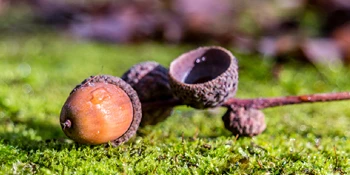
The Grounds Guys provide effective methods for collecting fallen acorns:
|
Last Updated June 14, 2023
Oak trees are a magnificent addition to any home or property, providing an exceptional canopy for shade and a brilliant display of foliage. Your oak trees may also be home to many creatures who find the acorns scattered on the ground to be little treasures. However, to you, acorns may be little more than a nuisance. If you're looking for the best way to pick up acorns from your lawn, look no further. The team at The Grounds Guys® is happy to share tips on acorn removal that will help keep your landscape looking its best.
Table of Contents:
When Do Acorns Fall?
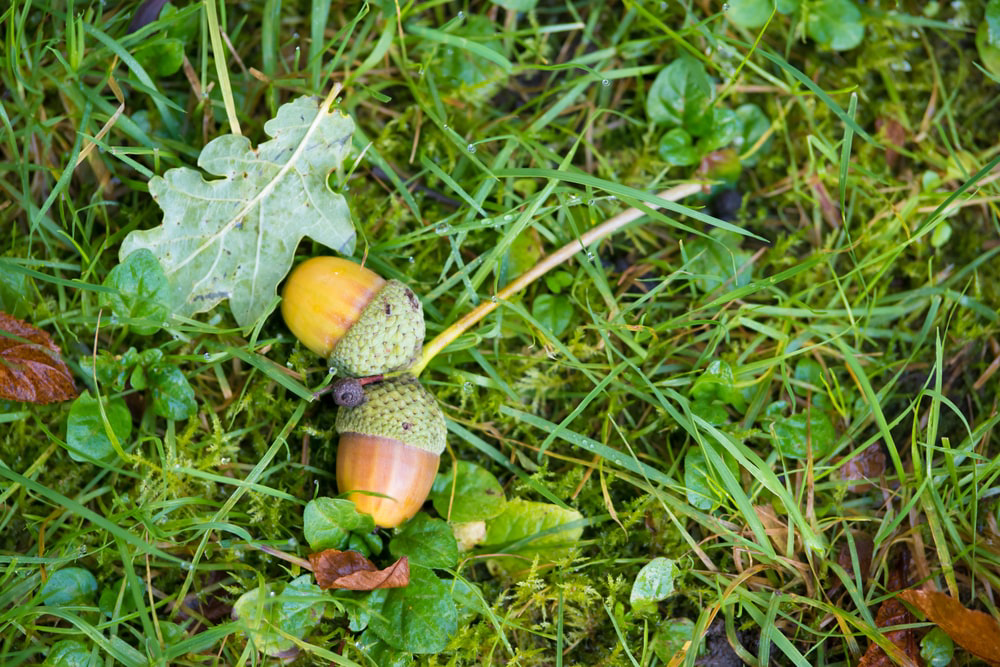
Oak trees will start acorn production when the weather warms up in the springtime. Homeowners usually see mature acorns fall from their oak trees from August through October. Once they fall off the tree, ripening acorns are a massive food supply for many creatures during winter. But if you pick up acorns and notice they're green, your oak tree may be suffering from the stress of an extremely hot or wet summer.
If you're concerned about the health of your oak tree, request a free estimate from The Grounds Guys. Our professional landscapers can prune and trim your tree, which is vital to maintaining its health and wellness. Keep reading to learn about the best ways to pick up acorns.
Tips on How to Pick Up Acorns from Lawn and Garden Areas
Fall is the time to gather your acorn removal tools to pick up all those acorns scattered on your lawn. Sure, you can pick up acorns with your hands and save some money. However, if you have a large property, that’s not the most efficient way to go about it. Contact The Grounds Guys to help remove acorns from a sizable yard, and let the professionals do all the work!
Best Acorn Removal Tools
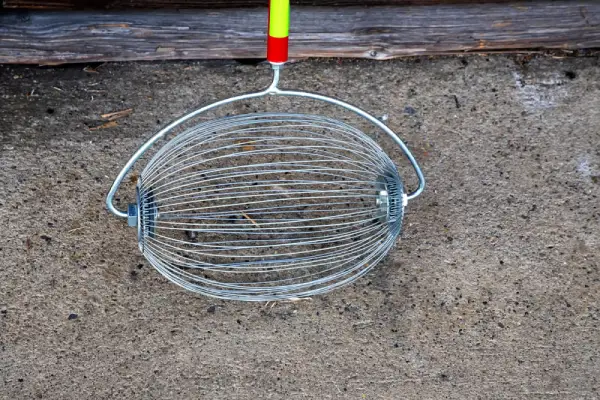
If you want to remove acorns from your yard, having the right nut-gathering tools goes a long way. If you live in an area where acorns are aplenty, investing in the best acorn removal tools can help keep your lawn looking good and clutter-free. These acorn removal tools are some of the best ways to pick up acorns.
Lawn Sweeper
If you already own a riding lawn mower, attaching a lawn sweeper is one of the best ways to pick up acorns. The sweeper can follow any riding mower or small tractor and collects debris such as acorns, twigs, leaves, and more. Depending on which type you buy, the lawn sweeper may use either a suction device or a scooping action to complete the task.
Leaf Vacuum
A lawn or leaf vacuum can either be purchased or rented. While it is typically used to collect leaves, it can also vacuum up your acorns. The unit is powered by a small motor and sucks the debris into the attached bag. Before buying or renting the machine, ensure the motor is powerful enough to retrieve the acorns, as equipment can vary.
Nut Gatherer/Weasel
This manual device consists of a long pole and cage that rolls along the surface of the lawn. As it passes over small objects such as acorns, they are collected inside the basket and emptied once it becomes full.
Rake
Raking is an effective but less efficient option that may be best suited for smaller jobs. The best way to pick up acorns with a rake is by using this tool to gather them into piles and then scooping them up with a shovel. The downside to this method is that the rake will also collect grass and other materials in the process.
Shop Vacuum
A shop vacuum with a wide hose can make short work of fallen acorns, but this method's efficiency relies upon the vacuum's power and the size and volume of acorns on the ground.
Tarps
The best way to pick up acorns using tarps is by laying several around the tree’s base and shaking the limbs to drop the acorns. The tarps can then be emptied, or the acorns may be swept or raked into piles and disposed of inyour green waste or compost bin.
The Benefits of Acorn Removal
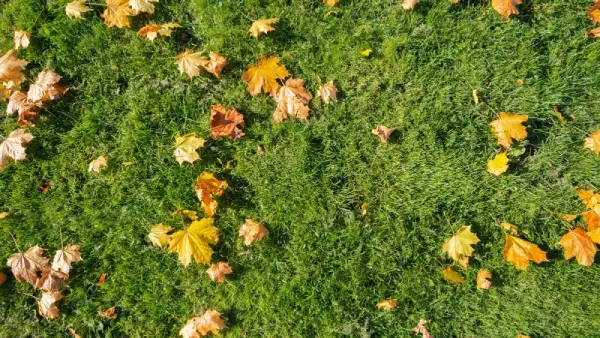
A lawn full of acorns can be unsightly and negatively impact your landscape. The benefits of acorn removal include the following:
Healthier Lawn: If acorns are left too long on the lawn, they may hinder grass growth.
Elimination of Unwanted Seedlings: Acorns may eventually sprout and produce seedlings wherever they land.
Safety: Acorns can be painful to walk on and may cause injury if they are ejected from a lawn mower.
Keeping Pests Away: Squirrels aren’t the only creatures that love picking up acorns; mice do too, and some carry diseases. Keeping your lawn free of acorns can help keep mice away and protect your health.
Make sure that picking up acorns is on your fall maintenance checklist. Staying on top of acorn removal will promote a lush, green lawn and keep your landscape looking its best
What to Do With Acorns in Your Yard
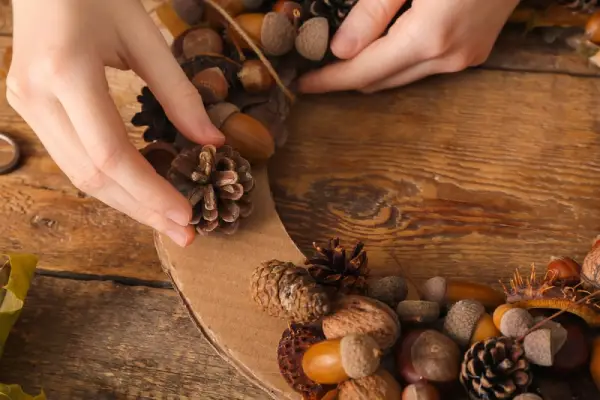
Once you’ve used your acorn removal tool to pick up acorns and place them in one spot, you’ll need to decide what to do with them. There are more options than you may think!
Did you know that you can harvest acorns from your oak tree? It’s true. However, if you plan to use them for food, never eat them raw. Acorns are tannin-rich foods that can be toxic if consumed in large amounts. But you can remove the tannins by boiling or soaking the acorns, throwing out the brown water, and repeating the process until the water runs clear.
Once the acorns are free of tannins, you can eat them. They have many health benefits and can be ground up into cornmeal, eaten whole, or made into mush.
Here are more examples of what to do with acorns in your yard:
- Use them for arts and crafts and holiday decorations.
- Use them to grow an oak tree.
- Use them in animal feeders.
- Donate them to zoos and wildlife preserves.
How to Dispose of Acorns
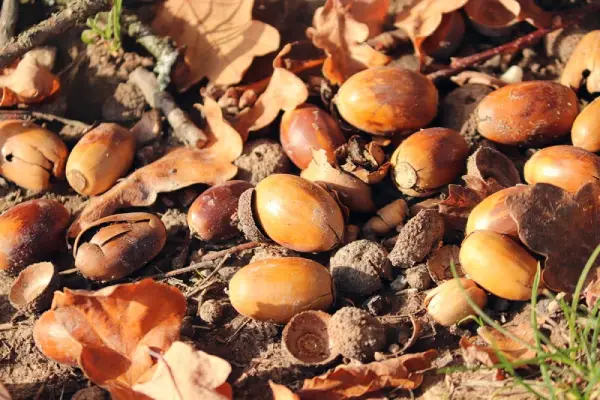
If you don’t plan to use them in any of the ways mentioned above, there are several ways to dispose of acorns. Here are some of our suggestions
Turn Them into Mulch
It’s always wise to have mulch in the garden. Mulch can suppress weeds, reduce soil water loss, and protect plants against extreme temperatures. There are several ways to turn acorns into mulch.
One of the easiest ways is to use a mulcher. If you don’t have one, make sure to rent or buy one that can be used to mulch acorns. Some mulchers only work best with leaves, so acorns can damage a mulcher not designed for acorn mulching.
You can rake up the acorns, place them on a tarp, and drive over them. You’ll probably have to do this several times. And while it’s one of the most affordable ways to turn them into mulch, it may not be too effective if your driveway slopes.
Burn Them
Be sure to research any town ordinance that prohibits open burning of material and with your local fire department before burning a bunch of acorns. If it’s not prohibited and ok with the fire department, go ahead and burn them, but do so carefully.
Toss Them in the Trash
Placing acorns in garbage bags and tossing them in the trash sounds simple enough. However, you’ll want to check with your local sanitation department to ensure they can be picked up.
Donate Them to a Free-Range Farmer
Some farmers may be interested in feeding their chickens or pigs your acorns. If you can find a free-range farmer nearby, contact them. This is another great way to put your acorns to good use.
Why Choose The Grounds Guys for Your Lawn Care Needs?
The Grounds Guys take pride in being part of your community and want to keep your neighborhood looking its best. We show up on time, ready to work with the latest equipment that is maintained daily. You can depend on us to provide award-winning service, with our Neighborly Done Right Promise® that guarantees your complete satisfaction. We offer free estimates and are happy to answer any questions regarding our lawn care and landscape services.
Contact The Grounds Guys for help with all of your landscaping and lawn care needs!
FAQs About Removing Fallen Acorns
As an industry leader, The Grounds Guys are committed to using our 20+ years of landscape knowledge and experience to help bring the vision for their property to life. This includes answering your questions about landscape and lawn care services. Below are answers to some of the most frequently asked questions about cleaning up acorns.
Do I need to remove acorns from my lawn?
Leaving fallen acorns in your yard can affect the health of your lawn. Tools like an acorn picker-upper can save you time and protect your yard from things like:
- Lawn damage: Acorns block sunlight and air from reaching grass, creating brown patches and thinning turf.
- Attracting pests: Rodents, insects, and wildlife may visit your yard to feast on the abundant food source.
- Safety hazards: Acorns create slipping risks on walkways and become dangerous projectiles when struck by lawn mowers.
- Unwanted seedlings: Sprouts may arise wherever acorns fall, competing with your established plants for nutrients and water.
A quality leaf vacuum or specialized acorn picker-upper can help you maintain a healthier, more attractive lawn while reducing these potential issues. The effort you invest in clearing acorns pays off with lusher grass and fewer maintenance headaches throughout the growing season.
Will a leaf blower work for removing acorns?
Yes, a leaf blower can be an effective tool in your acorn removal arsenal when used correctly. Many homeowners find that a combination leaf blower and vacuum provides the most efficient solution for complete acorn cleanup.
Leaf blowers work best for acorn removal under these conditions:
- Dry weather with no recent rainfall
- Acorns that haven't become embedded in the soil
- Level lawn areas without many obstacles
Start by using your leaf blower to move acorns into manageable piles rather than scattering them across your yard. Once acorns are gathered, switch to a leaf vacuum to collect the piles. This two-step approach proves far more effective than manual raking.
For optimal results, use the leaf blower at moderate power settings to avoid damaging grass. High-quality acorn picker-upper tools can also supplement your efforts in areas where blowers and vacuums might struggle, such as flower beds or around landscape features.
What not to do when removing acorns from the yard
Don't rely solely on a standard leaf blower for complete acorn removal. Basic blowers struggle with acorns that have started to decompose or those partially buried in dense turf. Avoid using maximum power settings that can damage grass or create divots in your lawn. Never blow acorns into street drains, neighboring properties, or natural waterways where they might cause blockages or unwanted oak growth.
Can I compost acorns or use them in the garden?
Acorns make excellent additions to your composting and gardening efforts when handled properly. Before adding acorns to your compost pile, crush or break them into smaller pieces to speed up decomposition, as whole acorns take significantly longer to break down. Mix crushed acorns with other compost materials like leaves, grass clippings, and kitchen scraps to create a nutrient-rich soil amendment.
For garden applications, transform acorns into protective mulch by running them through a mulcher designed to handle nuts and seeds. This natural mulch helps retain soil moisture, suppress weeds, and slowly releases nutrients back into the soil as it breaks down. If you've collected acorns using an acorn picker-upper tool, you can also strategically place them in wildlife-friendly areas of your yard as food sources for birds, squirrels, and other local fauna.
What not to do when composting acorns
Never add whole, uncrushed acorns directly to garden soil, as they may sprout into unwanted oak seedlings throughout your landscape. Avoid acorns that show signs of mold, insect damage, or disease to keep these issues from spreading to your garden. Don't place acorn mulch directly against tree trunks or plant stems, as this can promote rot and pest problems.
This article is intended for general informational purposes only and may not be applicable to every situation. You are responsible for determining the proper course of action for your home and property. The Grounds Guys are not responsible for any damages that occur as a result of this blog content or your actions. For the most accurate guidance, contact The Grounds Guys location nearest you for a comprehensive, on-site assessment.